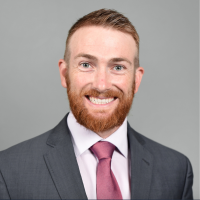Your Name: Corey Reutlinger
Pronouns: He/him/his
Please introduce yourself: Who are you and what are your research/teaching/activist interests?
My name is Corey Reutlinger. I’m a recent PhD in the Hugh Downs School of Human Communication. My research focuses on problematic and conflict-ridden communication in everyday social interactions. This means I look at microaggressions, transgressions, bullying, teasing, joking, slips, and hurtful comments, to name a few. I use mathematical language and game theory to approach a pragmatic, descriptive analysis of these topics as interactive communicative phenomena. I love teaching topics in organizational communication, disability/crip studies, conflict and negotiation, communication theory, and quantitative, qualitative, and arts-based research methods. I also work to coordinate and design anti-oppression and de-escalation training with several communities in and out of the academy that incorporates gaming strategies for navigating and repairing potentially difficult situations and harmful social interactions.
What are you passionate about?
I genuinely care about helping people experience everyday interactions that end with good communication. I want to create spaces where people are not afraid to say what they want to say when they want to say it while also maintaining accountability for what happens. I’m passionate about building conversations centered around empathy, accessibility, and social justice in order to reduce discrimination and marginalization of underrepresented people and communities.
What does transformation mean to you?
Transformation is about radical change. A question that continually guides my actions is, “why do our interactions not always end with good communication?” I want to understand what is happening in our daily conversations and what practices can help transform problematic communication patterns. At the heart of what I do is transforming the way we observe, practice, and talk about miscommunication in our everyday spaces (including life and work) so that we can have better interactions with good beginnings and endings.
What do you value most about the Transformation Project?
I value the community, collaboration, and innovativeness of the Transformation Project. Everything we do is practical, research-driven, and community-oriented. I never feel alone in my efforts to engage with transformation because my friends and colleagues are always there to support my ideas and projects and offer a helping hand when possible. We also take time to have fun and get to know each other. I especially enjoy the writing retreats that the Transformation Project schedules for us.
How has the Transformation Project supported you and your work in the past?
One of my first ever projects in the Hugh Downs School of Human Communication focused on understanding how disabled students in higher education experienced accessibility barriers with assistive technologies when inside classroom spaces. The Transformation Project funded and supported my phenomenological study, which I then presented at the International Congress of Qualitative Inquiry (ICQI) conference. The Transformation Project has since supported several other projects of mine and has also named me as a Jeanne Lind Herberger fellow in conflict communication during the 2019-2020 academic year. I continue to focus on projects that aim to repair problematic, conflict communication patterns in social interactions.
In what ways do you want to transform the future?
I want to transform the way people communicate during emotionally-heightened, ambiguous situations. This can mean something as simple as teaching people how to approach interactions with care and understanding so that they can find commonalities with others. I’d like to train people on how to craft intentional messages and how to respond to potentially harmful communication by using pragmatic, conversational preferences rather than relying solely on personal preferences when making decisions. Also, I want to change the way we interact in classrooms. I think as an educator there is always room to incorporate more accessibility in teacher-student interactions by normalizing practices like rest and recovery, flexible attendance and deadlines, changing grading standards, and modifying testing procedures. Too often the disabled or neurodiverse body is not considered in classroom designs. So, I would like to continue transforming the classroom experience.
What is your favorite dessert (and can you share a recipe for it)?
My favorite dessert is my mom’s Butterfinger Dessert.
1. Start with 2 cups of graham crackers (~28 squares) crushed with a rolling pin, 1 cup of soda crackers (~28 crackers) crushed, and ½ cup of sugar. Mix these together in a bowl.
2. Melt ½ cup oleo-margarine (or Blue Bonnet). Pour this over the mixture in step 1 and stir together.
3. Put 2/3 of the mixture in step 2 into a 9”x13” pan and spread it for a base.
4. In a separate bowl, beat together 2 packages of instant vanilla dry pudding. Mix together with 2 cups of milk until thick, using a whisk or spoon.
5. Add 1 quart of soft vanilla ice cream to the pudding and milk mixture. Once mixed, put this over your base. Then, refrigerate until set.
6. After the dish is set, put Cool Whip (an 8 oz package should do the trick) over top of the ice cream, pudding, milk mixture from step 5.
7. Crush 5 large Butterfinger candy bars in a Ziploc bag with a rolling pin. Then add the crushed Butterfingers to the other 1/3 of your mixture from step 2. When mixed, sprinkle this over the Cool Whip topping.
8. Refrigerate until ready to serve.
